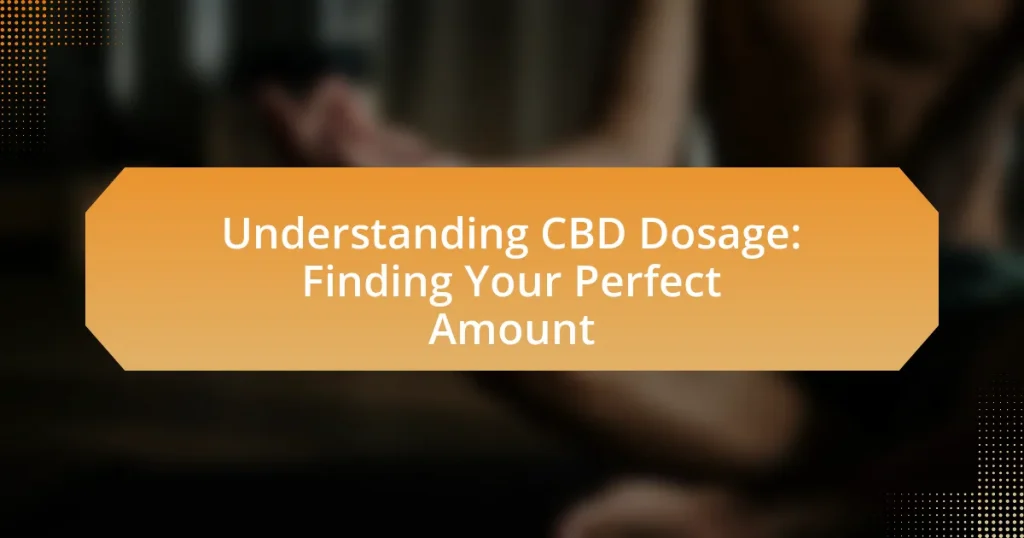The article focuses on understanding CBD dosage, emphasizing its importance for achieving therapeutic effects while minimizing side effects. It outlines how factors such as body weight, metabolism, and the specific condition being treated influence the ideal dosage for individuals. The article discusses methods for determining dosage, the impact of different forms of CBD on absorption, and the significance of consulting healthcare professionals for personalized guidance. Additionally, it highlights common mistakes in dosing and offers practical strategies to enhance the CBD dosing experience, ensuring users can find their optimal amount effectively.

What is CBD Dosage and Why is it Important?
CBD dosage refers to the specific amount of cannabidiol that an individual consumes, which is crucial for achieving desired therapeutic effects while minimizing potential side effects. Proper dosing is important because it can vary significantly based on factors such as body weight, metabolism, the condition being treated, and individual sensitivity to CBD. Research indicates that starting with a low dose and gradually increasing it allows users to find their optimal dosage, enhancing efficacy and safety. For instance, a study published in the journal “Cannabis and Cannabinoid Research” found that individualized dosing can lead to better outcomes in managing conditions like anxiety and chronic pain.
How does CBD dosage affect its effectiveness?
CBD dosage significantly affects its effectiveness, as the optimal amount can vary based on individual factors such as body weight, metabolism, and the condition being treated. Research indicates that lower doses may be less effective for certain conditions, while higher doses can lead to increased therapeutic benefits, but also potential side effects. A study published in the journal “Frontiers in Pharmacology” found that a dosage of 300 mg of CBD was effective for anxiety relief, while lower doses did not yield the same results. Therefore, finding the right dosage is crucial for maximizing the therapeutic effects of CBD.
What factors influence the ideal CBD dosage for individuals?
The ideal CBD dosage for individuals is influenced by several key factors, including body weight, metabolism, the condition being treated, individual tolerance, and the method of consumption. Body weight plays a significant role, as individuals with higher body mass may require larger doses to achieve the desired effects. Metabolism affects how quickly CBD is processed in the body, impacting the dosage needed for efficacy. The specific condition being treated also dictates dosage; for example, chronic pain may require higher doses compared to anxiety. Individual tolerance varies widely, meaning some people may respond to lower doses while others need more. Lastly, the method of consumption—such as oils, edibles, or topicals—can alter the bioavailability of CBD, influencing the effective dosage.
How does body weight impact CBD dosage recommendations?
Body weight significantly impacts CBD dosage recommendations, as individuals with higher body weight may require larger doses to achieve the desired effects. Research indicates that CBD dosage is often calculated based on a person’s weight, with a common guideline suggesting 1-6 mg of CBD per 10 pounds of body weight. For example, a person weighing 150 pounds might start with a dosage range of 15-90 mg of CBD. This weight-based approach is supported by pharmacokinetic studies that show how body mass can influence the distribution and metabolism of cannabinoids in the body, affecting their efficacy and duration of action.
What are the common methods for determining CBD dosage?
Common methods for determining CBD dosage include starting with a low dose and gradually increasing it, using weight-based calculations, and considering the condition being treated. Starting low allows individuals to assess their tolerance and response to CBD, which is crucial since effects can vary widely among users. Weight-based calculations typically suggest a dosage of 1-6 mg of CBD per 10 pounds of body weight, providing a personalized approach. Additionally, the specific condition being treated can influence dosage; for instance, higher doses may be recommended for chronic pain compared to anxiety. These methods are supported by anecdotal evidence and some preliminary studies, indicating that individualized dosing is essential for effectiveness and safety.
How do different forms of CBD (oils, edibles, capsules) affect dosage?
Different forms of CBD, such as oils, edibles, and capsules, affect dosage due to their varying bioavailability and absorption rates. CBD oils typically have higher bioavailability, allowing for quicker absorption into the bloodstream, which can lead to more immediate effects. In contrast, edibles undergo digestion, resulting in a slower onset of effects and often requiring a higher dosage to achieve similar results. Capsules, while convenient, also have a delayed onset similar to edibles, and their dosage can be more precise but may not provide the same rapid effects as oils. Studies indicate that the bioavailability of CBD oil can be as high as 35%, while edibles may only reach about 4-20%, underscoring the importance of form when determining effective dosage.
What role does the concentration of CBD play in dosage calculations?
The concentration of CBD is crucial in dosage calculations as it determines the amount of CBD present in a given volume of product. Higher concentrations mean that less product is needed to achieve the desired dosage, while lower concentrations require larger volumes to reach the same effect. For example, a CBD oil with a concentration of 1000 mg per 30 mL bottle contains approximately 33.3 mg of CBD per mL, guiding users in measuring their intake accurately. This relationship between concentration and dosage is essential for effective and safe use, ensuring individuals can tailor their consumption to their specific needs.

How Can You Find Your Perfect CBD Dosage?
To find your perfect CBD dosage, start by considering your body weight, the condition you are addressing, and your individual tolerance. Research indicates that a common starting point is 1-6 mg of CBD per 10 pounds of body weight, adjusted based on personal response and desired effects. For example, a person weighing 150 pounds might begin with a dosage of 15-30 mg. Gradually increase the dosage every few days until the desired effects are achieved, while monitoring for any side effects. This method is supported by studies that highlight the importance of individual variability in response to CBD, emphasizing that personal experimentation is key to determining the optimal dosage.
What steps should you take to determine your ideal dosage?
To determine your ideal dosage of CBD, start by assessing your individual needs, including factors such as body weight, the condition being treated, and personal tolerance levels. Next, consult with a healthcare professional who can provide personalized guidance based on your health history and specific circumstances. After that, begin with a low dose and gradually increase it while monitoring your body’s response to find the optimal amount that alleviates symptoms without causing adverse effects. Research indicates that starting low and going slow is effective, as individual responses to CBD can vary significantly; for instance, a study published in the Journal of Pain Research found that dosages ranging from 20 mg to 1500 mg per day were used effectively among participants, highlighting the importance of personalized dosage adjustments.
How can you start with a low dose and gradually increase it?
To start with a low dose and gradually increase it, begin by selecting a minimal dosage of CBD, such as 5-10 mg per day. This approach allows the body to acclimate to the compound without overwhelming it. After a week, assess how you feel and consider increasing the dosage by 5 mg increments if necessary. This method is supported by anecdotal evidence from users who report that gradual increases help in identifying the optimal dosage for individual needs, minimizing potential side effects.
What signs indicate that you have found the right dosage?
Signs that indicate you have found the right dosage of CBD include experiencing the desired therapeutic effects without significant side effects. When the right dosage is achieved, individuals often report reduced anxiety, improved sleep quality, or relief from chronic pain, depending on their specific needs. Additionally, the absence of adverse reactions such as fatigue, nausea, or irritability further confirms that the dosage is appropriate. Research indicates that optimal dosing varies among individuals, and monitoring personal responses is crucial for determining effectiveness.
Why is it important to consult with a healthcare professional?
Consulting with a healthcare professional is crucial for ensuring safe and effective use of CBD. Healthcare professionals can provide personalized advice based on individual health conditions, potential drug interactions, and appropriate dosages. Research indicates that CBD can interact with various medications, such as blood thinners, which underscores the importance of professional guidance to avoid adverse effects. Additionally, healthcare professionals can help monitor the patient’s response to CBD, adjusting dosages as necessary to achieve optimal therapeutic outcomes.
What questions should you ask your doctor about CBD dosage?
When discussing CBD dosage with your doctor, you should ask the following questions: “What is the recommended starting dosage for my specific condition?” This question helps establish a baseline for treatment. Additionally, inquire, “How should I adjust my dosage based on my response?” This allows for personalized adjustments. You should also ask, “Are there any potential side effects I should be aware of?” Understanding side effects is crucial for safe usage. Furthermore, ask, “How does CBD interact with my current medications?” This ensures there are no harmful interactions. Lastly, inquire, “What form of CBD do you recommend for my needs?” Different forms can have varying effects and bioavailability.
How can a healthcare professional help tailor your dosage?
A healthcare professional can help tailor your dosage by assessing your individual health needs, medical history, and specific conditions. They utilize their expertise to determine the appropriate CBD dosage based on factors such as body weight, metabolism, and the severity of symptoms. Research indicates that personalized dosing can enhance efficacy and minimize side effects, as evidenced by studies showing that individualized approaches lead to better patient outcomes in cannabinoid therapy.

What Are the Common Mistakes in CBD Dosage?
Common mistakes in CBD dosage include starting with too high a dose, not considering individual body weight and metabolism, and failing to adjust dosage based on effects. Many users mistakenly believe that more CBD will yield better results, leading to unnecessary side effects. Research indicates that optimal dosing varies significantly among individuals due to factors such as body chemistry and the condition being treated. Additionally, neglecting to track dosage and effects can result in ineffective treatment, as users may not identify the right amount for their needs.
What are the pitfalls of self-dosing CBD without guidance?
Self-dosing CBD without guidance can lead to several pitfalls, including ineffective dosing, potential side effects, and interactions with other medications. Ineffective dosing occurs when individuals do not accurately determine the appropriate amount for their specific needs, which can result in insufficient therapeutic effects. Additionally, without professional oversight, users may experience side effects such as fatigue, diarrhea, or changes in appetite, which can vary based on individual tolerance and the CBD product used. Furthermore, CBD can interact with various medications, such as blood thinners, leading to unintended health risks. Research indicates that proper dosing and guidance can significantly enhance the therapeutic benefits of CBD while minimizing adverse effects, underscoring the importance of consulting healthcare professionals before self-dosing.
How can incorrect dosage lead to ineffective results?
Incorrect dosage can lead to ineffective results by either underdosing or overdosing, which can prevent the desired therapeutic effects of CBD. When individuals take too little CBD, they may not experience any noticeable benefits, as the dosage may fall below the threshold needed to elicit a response in the body’s endocannabinoid system. Conversely, overdosing can lead to adverse effects that may overshadow the potential benefits, causing discomfort or negative reactions that discourage continued use. Research indicates that finding the right dosage is crucial, as a study published in the Journal of Pain Research found that optimal dosing is essential for achieving effective pain relief and minimizing side effects.
What are the risks of taking too much CBD at once?
Taking too much CBD at once can lead to several risks, including drowsiness, gastrointestinal issues, and changes in appetite. High doses of CBD may cause sedation, which can impair cognitive and motor functions, making activities like driving dangerous. Additionally, excessive consumption can result in diarrhea and nausea, as reported in studies where participants experienced these side effects at higher doses. Furthermore, CBD can interact with certain medications, potentially altering their effectiveness or increasing side effects.
How can you avoid common dosing errors?
To avoid common dosing errors, individuals should carefully measure their CBD dosage using precise tools like a calibrated dropper or scale. Accurate measurement is crucial because even small variations in dosage can lead to ineffective results or adverse effects. Research indicates that inconsistent dosing can occur when relying on imprecise methods, such as estimating amounts visually. Therefore, utilizing standardized measuring devices ensures that users administer the correct amount consistently, minimizing the risk of dosing errors.
What tips can help ensure accurate CBD dosing?
To ensure accurate CBD dosing, individuals should start with a low dose and gradually increase it while monitoring their body’s response. This method allows for the identification of the optimal dosage that provides the desired effects without adverse reactions. Research indicates that individual factors such as body weight, metabolism, and the condition being treated can influence the appropriate dosage, making personalized adjustments essential for effectiveness. Additionally, using a reliable product with clear labeling on CBD content helps in achieving precise dosing, as products can vary significantly in concentration.
What practical strategies can enhance your CBD dosing experience?
To enhance your CBD dosing experience, start by determining your ideal dosage through a gradual titration method, which involves beginning with a low dose and slowly increasing it until you achieve the desired effects. This strategy is supported by research indicating that individual responses to CBD can vary significantly, making personalized dosing essential for effectiveness. Additionally, keeping a dosing journal can help track your experiences and effects, allowing for informed adjustments over time. Studies have shown that consistent monitoring can lead to better outcomes in managing symptoms with CBD.


